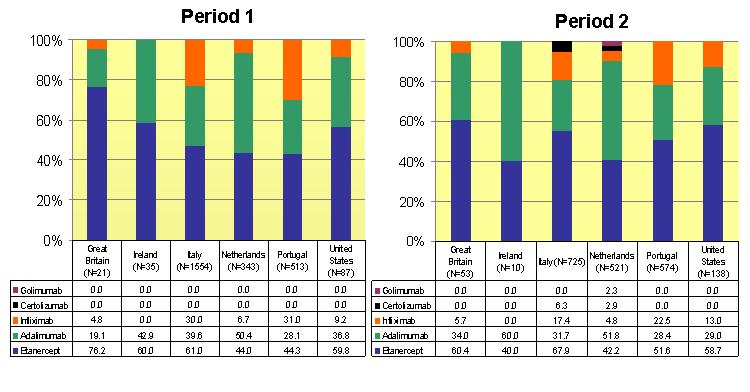Session Information
Session Type: ACR Poster Session A
Session Time: 9:00AM-11:00AM
Background/Purpose: Biologic agents are effective treatment for rheumatoid arthritis (RA), but factors exist that may influence the prescription of these drugs in different countries. We compared the prescription of TNF inhibitors (TNFi) among RA patients during two time periods by rheumatologists in Great Britain, Ireland, Italy, the Netherlands, Portugal, and the US who used the METEOR database. We hypothesized that the relative distribution of TNFi prescriptions for RA may vary among countries with different healthcare systems.
Methods: The international online Measurement of Efficacy of Treatment in the Era of Outcome in Rheumatology (METEOR) database is used at 124 hospitals in 38 countries and contains demographic and clinical data about >32,000 RA patients. This database was queried to compare use of TNFi (infliximab, etanercept, adalimumab, certolizumab pegol, and golimumab) during two one-year periods: July 2009-June 2010 (Period 1) and July 2011-June 2012 (Period 2). Data were extracted for 2553 patients in Period 1 and 2021 patients in Period 2. We compared TNFi use across the five countries separately for each time period. For each country, we also compared TNFi use during Period 1 to that during Period 2. A chi-square test was used to calculate significance, Fisher’s exact test was used to analyze cell size <5 and SAS 9.3 was used for all analyses.
Results: Relative use of each TNFi differed significantly across all countries within each time period (p<0.0001). Comparing TNFi use at US sites to sites in EU countries combined, infliximab was prescribed significantly less at US sites (9.2% vs. 25.7%, p<0.0001) for Period 1. Use of other TNFi did not differ significantly for either time period between US sites and all EU sites combined. When TNFi use was compared across the two time periods, use of infliximab and adalimumab was significantly lower (17.3% vs. 29.9%, p<0.0001, and 31.7% vs. 39.5%, p=0.0003, respectively) and use of etanercept was significantly higher (67.8% vs.61.0%, p=0.0015) in Italy during Period 2, compared to Period 1. In Portugal, infliximab use was significantly lower (22.4% vs. 30.9%, p=0.0015) and etanercept use was significantly higher (51.5% vs. 44.2%, p = 0.0159) during Period 2, compared to Period 1. Otherwise, relative prescription of individual TNFi did not differ significantly across the two time periods in any other countries.
<>Image/graph:
Conclusion: The relative prescription of various TNFi, as recorded in the METEOR database, differed significantly across several EU countries and the US during two distinct time periods. Infliximab was prescribed significantly more often than other TNFi at sites in those EU countries examined compared to the US sites in period 1. In Italy and Portugal, etanercept was prescribed significantly more than other TNFi in period 2, compared to period 1. Further study is warranted to identify factors that drive the different TNFi prescribing patterns in these countries.
To cite this abstract in AMA style:
Salomon-Escoto K, Kini N, Person SD, da Silva JAP, Ferraccioli G, Huizinga TWJ, Landewé RBM, Moots R, van der Heijde D, Veale DJ, Gravallese EM, Kay J. TNF Inhibitor Use Across Countries in Two Time Periods Using the Meteor Database [abstract]. Arthritis Rheumatol. 2015; 67 (suppl 10). https://acrabstracts.org/abstract/tnf-inhibitor-use-across-countries-in-two-time-periods-using-the-meteor-database/. Accessed .« Back to 2015 ACR/ARHP Annual Meeting
ACR Meeting Abstracts - https://acrabstracts.org/abstract/tnf-inhibitor-use-across-countries-in-two-time-periods-using-the-meteor-database/

